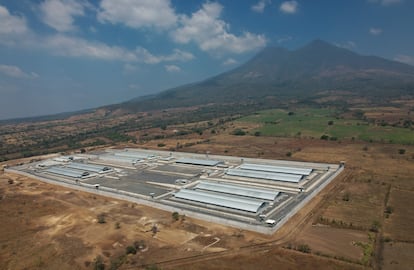El Salvador’s mega-prisons as an electoral promise in Colombia
Diego Molano and Jaime Arizabaleta, pre-candidates for the mayoralties of Bogotá and Cali, have proposed building prisons inspired by Nayib Bukele’s crusade against crime


El Salvadoran President Nayib Bukele has found a landing strip in Colombia for his most controversial government policy: mega-prisons to fight crime. Diego Molano and Jaime Arizabaleta, pre-candidates for the mayoralties of Bogotá and Cali, respectively, representing the conservative Democratic Center party, are advocates of authority and the iron fist approach as a solution not only to crime, but also corruption. Inspired by Bukele, they have proposed constructing mega-prisons if they win the October 29 regional elections.
The first to unveil the idea was Arizabaleta, who announced the joint proposal on his Twitter account Wednesday night: “There will be two Bukele-style mega-prisons in Colombia, one in Bogotá and another in Cali, that I will build for criminals and corrupt people,” he wrote. Molano, a former Minister of Defense in the government of Iván Duque, developed the idea on Thursday in an interview with Blu Radio: “We need a prison in Bogotá, a mega-jail to hold at least 3,000 criminals.”
Neither Arizabaleta nor Molano have referred to the potential costs of their proposed mega-prisons, or the amount of time it would take to build them. However, it marks a first palpable manifestation of the admiration held by a broad sector of the Colombian right for the Salvadoran president. Bukele’s name is increasingly heard in the streets, spoken by people who believe that a crusade like the one he undertook in El Salvador should be replicated in Colombia. This drift has also crept into polls such as one conducted in May by Datexco, in which 55% of the those asked if the country needs a president like Bukele answered in the affirmative.
Fernando Tamayo, a penal law and penitentiaries expert at the University of the Andes in Bogotá, explains that the biggest problem these types of prisons pose is the difficulty of managing them: facilitating visits with all the controls these imply and guaranteeing security among inmates, and maintaining surveillance and order among such a huge prison population, requires a large number of guards. And in Colombian jails, Tamayo points out, there are not enough of them. “What the Latin American experience of mega-prisons in El Salvador has shown us is that the rights of the population deprived of liberty do not matter directly,” he tells EL PAÍS via telephone.
The idea of importing Bukele’s model is also an evident symptom of the absence of clear leadership in the Colombian right wing. Not even María Fernanda Cabal, who could be considered the most conspicuous conservative leader in the country, has contributed any novel ideas: she too has looked to Bukele for inspiration, sparing no complimentary adjectives for the Salvadoran president.

The proposal has had considerable impact in Colombia due to the insecurity being experienced in several parts of the country. In Buenaventura, which has been described by the government of President Gustavo Petro as a “laboratory” of total urban peace after understandings were reached with the gangs that operate there, terror has returned in recent weeks. In addition, skepticism towards negotiations with armed groups such as the National Liberation Army (ELN) and the Central General Staff (EMC), a splinter group of the FARC, fueled by atrocities such as the murders of four indigenous minors in May, favors the idea of an iron fist.
However, authoritarianism has left a huge stain on Colombian history: the extrajudicial executions, also known as “false positives,” carried out during the administration of Álvaro Uribe (2002-2010), in which the military, encouraged to increase combat casualties, killed civilians and passed them off as guerrillas. In 2021, then-minister of defense Molano faced a no-confidence vote in Congress under opposition accusations of meting out “warlike treatment” in the repression of popular demonstrations against the government of Iván Duque.
In El Salvador, the government’s policy has also come under scrutiny. Under the state of emergency declared over a year ago by Bukele, the authorities have arrested more than 60,000 gang members in a country besieged for decades by criminal organizations. However, a Human Rights Watch report last January revealed that “large-scale abuses” have been committed, including due process violations, mass arrests, deaths in custody and overcrowding.

Overcrowding is another issue that arises from mega-prisons. Professor Tamayo recalls that in 1998, when an unconstitutional state of affairs was declared — a tool used by the Constitutional Court when certain requirements are met to address any serious situation — due to prison overcrowding, there were 33,009 prisoners in the country and an overcrowding ratio of 31%. Since then, more quotas have been created but there has been no solution: today in Colombia, overcrowding in prisons stands at 24%, and at times it has reached 50%. “That idea of providing more quotas as a way to control overcrowding has been shown to be a failure, because the quotas are being created and are being filled,” says Tamayo.
Tamayo acknowledges that it is difficult to discuss Molano and Arizabaleta’s proposal, as it lacks a clear structure, and the idea of social reintegration — which is the objective — remains difficult to achieve due to a lack of resources. However, he does venture an opinion, based on information gathered by several specialized studies: “In general, the systems that bet on greater contact of persons deprived of liberty with the outside world, with their families, and with a greater possibility of reintegration into society, have a greater capacity for people not to reoffend.”
Tamayo explains that the penal system awakens strong feelings among the public, derived from their fear of crime, insecurity, and violence. “The big problem is that these projects have not shown that they are truly efficient in combating insecurity,” he points out. He adds that many of these models appear efficient in the short term, because they generate positive figures in terms of convictions, imprisonment, and an increase in the prison population, which creates a feeling of greater security. However, he concludes: “In the end, what they end up generating is more exclusion and greater social problems.”
Sign up for our weekly newsletter to get more English-language news coverage from EL PAÍS USA Edition
Tu suscripción se está usando en otro dispositivo
¿Quieres añadir otro usuario a tu suscripción?
Si continúas leyendo en este dispositivo, no se podrá leer en el otro.
FlechaTu suscripción se está usando en otro dispositivo y solo puedes acceder a EL PAÍS desde un dispositivo a la vez.
Si quieres compartir tu cuenta, cambia tu suscripción a la modalidad Premium, así podrás añadir otro usuario. Cada uno accederá con su propia cuenta de email, lo que os permitirá personalizar vuestra experiencia en EL PAÍS.
¿Tienes una suscripción de empresa? Accede aquí para contratar más cuentas.
En el caso de no saber quién está usando tu cuenta, te recomendamos cambiar tu contraseña aquí.
Si decides continuar compartiendo tu cuenta, este mensaje se mostrará en tu dispositivo y en el de la otra persona que está usando tu cuenta de forma indefinida, afectando a tu experiencia de lectura. Puedes consultar aquí los términos y condiciones de la suscripción digital.








































